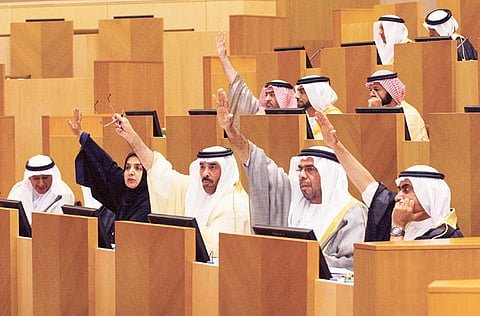Environment ministry taken to task over poor planning
FNC members highlight failure to deal with emergencies

Dubai: The Ministry of Environment and Water yesterday came under fire from members of the Federal National Council, which accused it of not having plans to tackle environmental emergencies, failing to lead environmental efforts and not cooperating with non-governmental organisations (NGOs).
“The Ministry of Environment and Water lacks emergency plans and funds to effectively address marine accidents,” a report by the FNC Committee on Agriculture and Fisheries said, citing an incident in which the White Whale ship which sank off Umm Al Quwain coast in October.
The FNC representatives said efforts should be made to correct or eliminate the root cause behind ships sinking and oil spills rather than beating around the bush. They also called for a contingency plan to address any marine accidents.
“[A study of] the incident showed the ministry lacked plans and funds to tackle environmental threats, accidents and disasters,” the report said.
Ahmad Obaid Al Mansouri, a member from Dubai, accused the ministry of not cooperating with NGOs and working groups and failing to lead the environmental efforts across the country.
The report pointed to the “ineffective” enforcement of laws and regulations in efforts to stop illegal practices by oil tankers and cargo and fishing ships, highlighting the grey area between jurisdiction of local and federal departments.
It highlighted that 1,320 tonnes of waste were dumped in the Dubai Creek by different ships last year.
The outcome of environmental research and development did not match environmental challenges and issues across the country, according to the report.
The representatives warned against desalination plants dotting the UAE’s coast line saying they are legally flushing massive quantities of brine, or waste water, carrying chlorine and metals into the Arabian Gulf daily.
Anti-scalants to reduce scale formation in desalination plants can produce increased and harmful algae growth when pumped back to the ocean.
The increased salinity of brine can drastically affects biodiversity while chlorine is very toxic for many organisms in the mixing zone — an area where effluents are diluted before flushing, according to the report
The representatives warned that the Gulf may act as a sink with a long-term risk of non-biodegradable substances such as copper building up.
The members also criticised the Environment Ministry for failing to effectively control the use of underground water, estimated at three billion cubic metres last year out of the total water consumption of 4.5 billion cubic metres annually.
Members of the House also blamed the ministry for failing to enforce of strict air-quality guidelines to stop quarries from emitting clouds of dangerous dust that can cause breathing problems and skin cancer. They quoted the Health Ministry which revealed that more than 7 per cent of patients suffer from these ailments.
Members were particularly concerned over 70 quarries in Fujairah and 30 others in Ras Khaimah, as they are very close to residential areas.
The members also quoted the Minister of Health as saying that 40 per cent of children and 15 per cent of the total population in the UAE suffer from asthma, mainly because of dust and fumes from plants.
The disposal of six million tonnes of waste annually in the UAE was another concern for the representative.
The FNC committee said out of 500 million cans of fizzy drinks sold in the UAE, only 25 million cans are recycled, with the remaining cans being dumped in waste drums.
Members of the House also expressed concern over efforts to combat desertification. They warned that desertification was “one of the greatest environmental challenges” for the UAE, which lost 34.39 per cent of its green areas between 1999 and 2007, with the Ministry of Environment and Water “doing nothing to stop or reverse this problem.”
The FNC representatives also stressed the lack of performance indexes to gauge the results of environmental awareness campaigns and how they affect the behaviours of individuals and institutions in the country.
However, Dr Rashid Ahmad Bin Fahd, Minister of Environment and Water, said that the country’s leaders had spared no efforts to expand greenery, fight desertification and conserve the environment for the present and future generations.
“The ministry is working on long-term goals — mainly keeping water security, boosting biodiversity, food and environment security,” Bin Fahd said.
Outlining UAE’s policy for protecting environment, Bin Fahd explained that the UAE seeks to protect the environment, preserve its diversity and natural equilibrium, fight all forms of pollution, develop natural resources, and preserve the various species in the UAE.
He added the ministry is working to protect society, the health of human beings and other living creatures from any activities or acts which pose a risk to the environment.
He said the ministry was working to implement international and regional conventions ratified or signed by the state in respect of environmental protection, pollution prevention and the preservation of natural resources.
The UAE has drawn a national anti-desertification action plan modelled on the requirements of the United Nations Convention to Combat Desertification which it joined in 1999. The federal cabinet also passed a national anti-desertification strategy and action plan.



